- Home
- Lauren Oliver
Broken Things
Broken Things Read online
Dedication
To MRK
For the stories
Contents
Cover
Title Page
Dedication
Part I
Brynn: Now
Brynn: Now
Mia: Now
Brynn: Now
Brynn: Now
Mia: Now
Mia: Then
Brynn: Now
Mia: Now
Brynn: Now
Brynn: Then
Brynn: Now
Brynn: Now
Mia: Now
Mia: Now
Brynn: Now
Brynn: Then
Mia: Now
Part II
Brynn: Now
Mia: Now
Brynn: Now
Brynn: Then
Mia: Now
Mia: Then
Brynn: Now
Mia: Then
Mia: Now
Part III
Brynn: Now
Mia: Then
Mia: Now
Brynn: Then
Brynn: Now
Mia: Now
Brynn: Then
Brynn: Now
Mia: Now
Mia: Then
Mia: Now
Brynn: Now
Brynn: Then
Mia: Now
Mia: Then
Brynn: Now
Brynn: Then
Mia: Now
Brynn: Now
Mia: Now
Brynn: Now
Part IV
Mia: Now
About the Author
Books by Lauren Oliver
Back Ads
Copyright
About the Publisher
Before we were the Monsters of Brickhouse Lane—
before everyone from Connecticut to California knew us by
that tagline, and blogs ran pictures of our faces, and searching
our names led to sites that crashed from all the traffic—
we were just girls, and there were only two of us.
Brynn
Now
Five years ago, when I had just turned thirteen, I killed my best friend.
I chased her down and cracked her over the head with a rock. Then I dragged her body out of the woods and into a field and arranged it in the center of a circle of stones I’d placed there with my other friend, Mia. Then we knifed her twice in the throat and five times in the chest. Mia was planning to douse her body with gasoline and light her on fire, but something went wrong and we bolted instead.
Here’s how everyone knew we were guilty: we had described the crime, more or less, in a fan-fic sequel to the book we were all obsessed with, The Way into Lovelorn.
Afterward, Mia and I split up. She went home and spent the evening conked out in front of the TV, without even bothering to clean up the gasoline that had soaked her jean shorts. I was more careful. I did a load of laundry—hauling ass to the local Bubble ’N’ Spin, since we didn’t have a machine at my house. The police were still able to extract samples of blood from my T-shirt, not Summer’s but a bit of animal blood, since we’d previously practiced the knifing ritual on a cat, also found in the field.
Owen Waldmann, Summer’s kind-of-maybe boyfriend, disappeared after the murder and didn’t return for twenty-four hours, at which point he claimed he didn’t know anything about it. He never said where he had gone.
He was lying, obviously. He was the one who orchestrated the whole thing. He was jealous because Summer had been hanging out with older boys, like Jake Ginsky, who was on the high school football team. That was the year Summer started growing up, leaving the rest of us behind, changing the rules.
Maybe we were all a little jealous of her.
I tackled Summer when she tried to run, hit her over the head with a rock, and dragged her back to Mia so that Mia and I could take turns stabbing her. Owen was the one who brought the can of gasoline and the one too stupid to dump the can after we mostly emptied it. It was found, later, just outside his garage, behind his dad’s lawn mower.
Owen, Mia, and me, Brynn.
The Monsters of Brickhouse Lane.
The child killers.
That’s the story the way everyone tells it, at least, a story repeated so many times, accepted by so many people, it has become fact. Never mind that the case against Mia and me never even made it out of family court. Try as hard as they could, the cops couldn’t make the facts fit. And half the information we told them was illegally obtained, since we’d never even been cautioned. Never mind that Owen was acquitted in criminal court, not guilty, free to pass go.
Never mind, either, that we didn’t do it.
In books, secret worlds are accessible by doors or keys or other physical objects. But Lovelorn was not such a world, and appeared at whim and only when it felt like it, with a subtle change like the slow shifting of afternoon to evening.
So it was that one day, three best friends—Audrey, Ashleigh, and Ava—were bored and hot and decided to explore the woods in the back of Ava’s house, though in truth there was little to explore that they hadn’t already seen.
That day, however, a curious thing happened when they set off into the woods.
—From The Way into Lovelorn by Georgia C. Wells, 1963
Brynn
Now
“Your physicals look fine.” Paulie bends over my file, scrubbing her nose with a finger. A big pimple is growing just above her right nostril. “Blood pressure’s great, liver looks good. Normal heart rate. I’d say you’re in good shape.”
“Thanks,” I say.
“But the most important thing is how you feel.” When she leans back, her blouse strains around the buttons. Poor Paulie. The residential director at Four Corners, she always has the dazed look of someone who just got into a fender bender. And she can’t dress for hell. It’s like she buys clothes for someone else’s body—too-tight Lycra blouses or too-big skirts and man shoes. Maybe she Dumpster-dives her whole wardrobe.
Summer used to do that: she got her clothes in bulk from the Salvation Army or just stole them. But she could make anything look good. She’d take an old band T-shirt, extra-large, and turn it into a dress, belting it with a bike chain and pairing it with old Chucks. Garbage fashion, she called it.
She was going to move to New York City and be a model when she turned sixteen, and afterward have her own fashion line. She was going to be a famous actress and write her memoir.
She was going to do so many things.
“I feel good,” I say. “Strong.”
Paulie adjusts her glasses, a nervous habit. “Six rehabs since eighth grade,” she says. “I want to believe you’re ready for a change.”
“Four Corners is different,” I say, dodging the question I know she wants to ask. Of all the rehabs I’ve been to, plus hospital detoxes, sober-living facilities, and halfway houses, Four Corners is the nicest. I have my own room, bigger even than my room at home. There’s a pool and a sauna. There’s a volleyball court on a bit of scrubby lawn and a flat-screen TV in the media room. Even the food is good—there’s a salad bar and smoothies and a cappuccino machine (decaf only; Four Corners doesn’t allow caffeine). If it weren’t for all the therapy sessions, it would be like staying at a nice hotel.
At least, I think it would be. I’ve never stayed at a hotel.
“I’m glad to hear it,” Paulie says. Her eyes are fish-big, wide and sincere behind her glasses. “I don’t want to see you back here in six months.”
“You won’t,” I say, which is kind of true. I’m not going to come back to Four Corners. I’m not leaving at all.
I like rehab. I like the whole routine of it, the clean rooms and the staff with their identical polo shirts and identically helpful expre
ssions, like well-trained dogs. I like the mottos posted everywhere on construction paper: let go or be dragged; live and let live; have an attitude of gratitude. Life in bite-size portions. Miniature Snickers–sized wisdom.
It turns out that after a first trip to rehab, it’s easy to hopscotch. All you have to do is make sure to flunk a pee test right before you’re supposed to get out. Then counselors get called in; insurance companies, social workers, and relatives are contacted; and pretty soon you’ve got yourself an extended stay. Even now that I’m eighteen and can technically leave on my own recognizance, it won’t be hard: you’d be amazed at how quickly people rally together when they suspect their patient might have killed someone before she was even menstruating.
I don’t like lying, especially to people like Paulie. But I keep the story simple and pretty basic—pills and booze, Oxy I used to steal from my mom—and apart from the actual I’m an addict part, I don’t have to fake it too much.
My mom was on Oxy the last time I was home, since some idiot in an SUV rear-ended her when she was coming home from a late shift at the hospital and fractured her spine in two places.
I get nightmares, panic attacks. I wake up in the night and still, all these years later, think I see the bright burst of a flash outside my window. Sometimes I hear the hiss of an insult, a voice whispering psycho, devil, killer. Sometimes it’s Summer I see, beautiful Summer with her long blond hair, lying on the ground in the middle of a circle of stones, her face a mass of terror—or maybe peaceful, smiling, because the story she had been writing for so long had at last come true.
That’s one thing I don’t talk about here, no matter how many times Trish or Paulie or any of the other counselors push. I don’t talk about Mia, or Summer, or Owen, or Lovelorn and what happened there, how we believed in it, how it became real.
In rehab, I can be whoever I want. And that means, finally, I don’t have to be a monster.
Lovelorn had its own weather, just as it had its own time. Sometimes the girls passed through into Lovelorn at high noon and found that within the quiet hush of the Taralin Woods it was all rose and purple, long shadows and crickets, and that the sun was already kissing the horizon. Just as often, when it was cold and rainy in their world, it was brilliantly sunny in Lovelorn, full of summertime bees and fat mosquitoes. One or another of the girls was always abandoning sweatshirts, scarves, or hats on the other side and being lectured for it later.
—From The Way into Lovelorn by Georgia C. Wells
Mia
Now
“Holy mother of funk.” Abby, my best friend, holds up a moldering piece of fabric between two white-gloved fingers. “What is this?”
Whatever it used to be—a jacket? a blanket? an area rug?—is now black, stiff with years of stains accumulating and drying, and full of holes where it’s been chewed up by a procession of insects. And it smells. Even though I’m halfway across the room and separated from Abby by mounds of books and newspapers, lamps and old AC units, and cardboard boxes containing a hundred different never-used, never-unpacked purchases, the kind you order off TV at midnight—blenders and multipurpose knives and Snuggies and even a rotisserie oven—the smell still makes my eyes water.
“Don’t ask,” I say. “Just bag it.”
She shakes her head. “Did your mom stash a dead body in here or something?” she says, and then, realizing what she’s said, quickly stuffs the cloth into a lawn-and-leaf bag. “Sorry.”
“That’s okay,” I say. That’s one of the things I love about Abby: she forgets. She legitimately fails to remember that when I was twelve, I was accused of murdering my best friend. That the first Google result that pops up when you type in Mia Ferguson is an article on a popular parenting blog called “How Do Kids Become Monsters? Who’s to Blame?”
Partly, that’s because Abby moved here only two years ago. She’d heard about the murder, sure—everyone’s heard about it—but secondhand is different. To people outside our town, Summer’s death was a tragedy, and the fact that three kids were the primary (okay, only) suspects, a horror, unimaginable.
But in Twin Lakes it was personal. Five years later, I still can’t walk around town without everyone glaring at me or whispering awful things. Once, a few years ago, a woman approached me outside the Knit Kit—I’d been looking at the baskets piled with fleecy, multicolored wool, and the sign in the window, Make Socks, Not War—lips puckered as if she were about to kiss me, and spat in my face.
Even my mom is abused whenever she has to go shopping or drop off laundry or go to the post office. I guess everyone blames her for raising a monster. At a certain point, it just became easier to stay inside. Luckily—or maybe unluckily—she has her own online marketing business. Since she can order everything from toilet paper to socks to milk on the internet, she can go six months without ever stepping out the door. When she announced a few days ago that she was going to visit her sister, I nearly had a heart attack. It’s the first time she’s left the house for more than an hour since the murder.
But then again, she didn’t exactly have a choice. After my mom’s “collections” started spreading, first onto our back porch, and then onto our front porch, and then into our yard, our neighbors started a campaign to get Mom and me thrown out. Apparently, our very presence was contaminating the neighborhood and single-handedly destroying the chance that our neighbors could ever sell their houses. While the town stopped short of taking legal action against us, they did give us two weeks to clean up or face fines for all sorts of environmental hazards. My mom went to stay with my aunt so she wouldn’t be in the way, sobbing every time I tried to throw out a used dinner napkin, and I got stuck sorting through five years’ worth of accumulated trash.
“Check this out, Mia.” Abby extracts a stack of ragged newspapers from beneath a broken standing lamp. “Now we know what was major news in”—she squints—“2014.”
I hoist a box from the floor, feeling a small rush of satisfaction when a bit of the carpet is revealed. I read off the side of the box: “‘With the amazing Slice and Dice, kitchen prep is a breeze!’”
“Maybe you should sell that. It’s still in the box, right?” Abby climbs to her feet with difficulty, using a TV stand for leverage. Abby is fat and very beautiful. She has light eyes and dark hair, the kind of lips that make people think of kissing, a perfectly straight nose, just slightly upturned.
When she was ten, she started a YouTube channel all about fashion and beauty. By fifteen, she had two million subscribers, sponsorships from major brands, and a flow of bank that meant her family could get out of Garrison, Iowa, and move back to Vermont, where her grandparents lived.
Abby travels to so many Beautycons, vidcons, and fashion weeks, she has to homeschool, which is how she and I ended up together—when she’s not traveling—five times a week, four hours a day, listening to Ms. Pinner drone on about everything from narrative techniques in The Sun Also Rises to the covalent bond. We meet at Abby’s house, three blocks away, for the obvious reason that there is nowhere to sit in my house. There’s hardly room to breathe.
The Piles have seen to that. They are ruthless. They breed. They multiply overnight.
“Sure,” I say. “If you like your veggies with a side of black mold.” I tuck the box beneath my arm and make my way to the front door, sticking to the path carved carefully between the Piles, an endless canyon of belongings—flattened cardboard boxes tied with twine, rolls and rolls of expired grocery store coupons, packing tape and rusted scissors, old sneakers and deflated inner tubes and no-longer-functional lamps—all stuff that my mom, for some reason, thinks it necessary to keep.
Outside, the sky is a weird color. The clouds are a seasick green. We’re supposed to have a few bad days of storms—maybe even a tornado—although nobody really believes that. We don’t get tornadoes in Vermont, at least not often, and half the time the news predicts one it’s just to boost ratings.
I heave the box into the Dumpster parked in our driveway. The
Dumpster is the big, industrial kind used for home renovations and construction projects, and already, after only two days, it’s half-full.
Back inside, Abby is red-faced, coughing, cupping a hand to her mouth.
“What?” I say. “What is it?”
“I don’t know.” She chokes out the words, eyes watering. “I think it’s an old pizza or something.”
“Leave it,” I say quickly, trying to ignore the twin rotor blades that start going at the bottom of my stomach. “Seriously. The sky looks like it’s about to throw up.”
“Are you sure?” Abby obviously feels embarrassed that I’m embarrassed. Which just makes me feel worse, especially since Abby’s not the kind of person who is easily made uncomfortable. She is the kind of person who, instead of wearing big sweatshirts or sweatpants and trying to disappear, wears feathered skirts and multicolored tights and dyes her hair a variety of colors, then spends four hours staging a photo shoot with her pet Maltese, Cookie Monster. “We barely made a dent.”
This is not entirely true. I can see several bare spots in the carpet. The TV and TV console have been revealed in the living room. I wonder whether we still have cable. “So?” I force a smile. “More for us to do tomorrow. Maybe we’ll even find a buried treasure.”
“Or the lost city of Atlantis,” Abby says, peeling off her gloves and depositing them in one of the open trash bags. Before she leaves, she grips my shoulders. “You’re sure-sure-sure? I won’t find you tomorrow suffocated under a pile of dirty laundry and old newspapers?”
I force a smile. That awful shredding feeling is still there, churning up my insides. But Abby wants to get out. And I don’t blame her.
I’ve been wanting out for as long as I can remember.
“Go,” I say, sidestepping her. “Seriously. Before a tornado sucks you somewhere over the rainbow.”
She rolls her eyes and gives her stomach a slap. “I’d like to see a tornado try.”
“You’re beautiful,” I call after her as she heads for the door.
“I know,” she calls back.

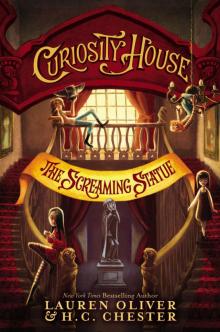 The Screaming Statue
The Screaming Statue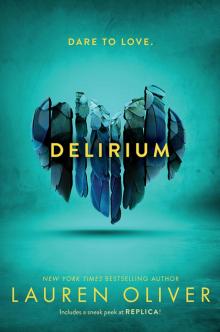 Delirium
Delirium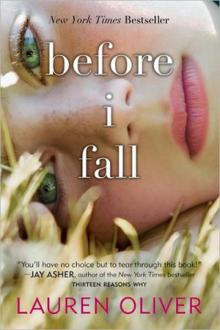 Before I Fall
Before I Fall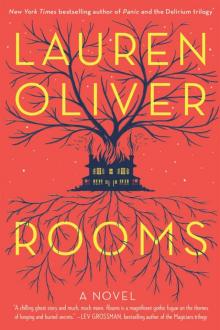 Rooms
Rooms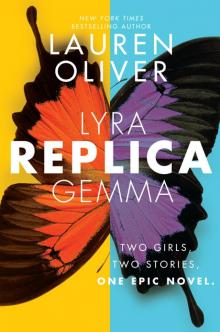 Replica
Replica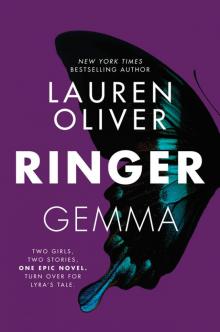 Ringer
Ringer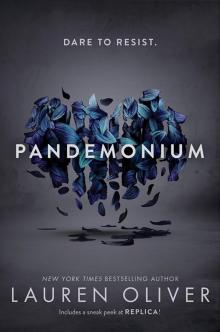 Pandemonium
Pandemonium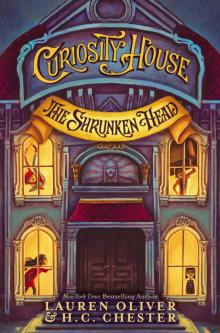 The Shrunken Head
The Shrunken Head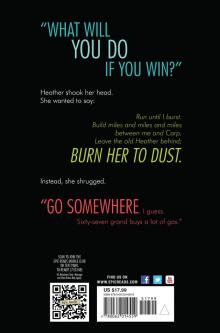 Panic
Panic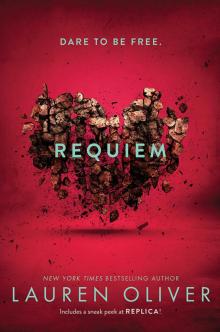 Requiem
Requiem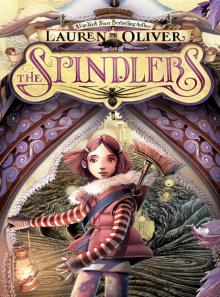 The Spindlers
The Spindlers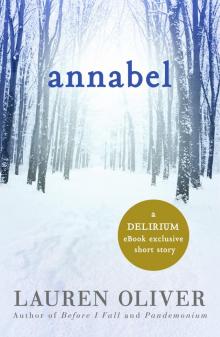 Annabel
Annabel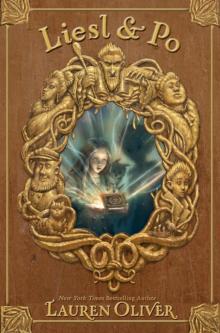 Liesl & Po
Liesl & Po Raven
Raven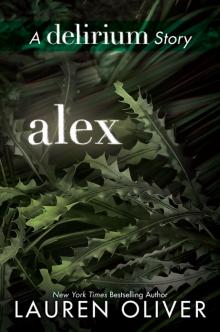 Alex
Alex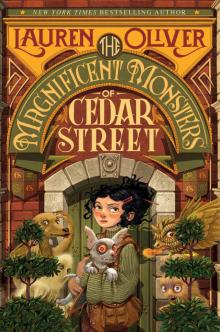 The Magnificent Monsters of Cedar Street
The Magnificent Monsters of Cedar Street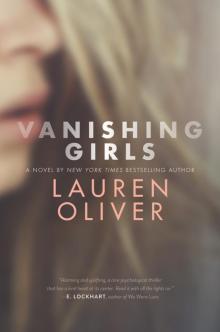 Vanishing Girls
Vanishing Girls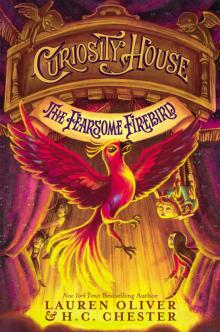 The Fearsome Firebird
The Fearsome Firebird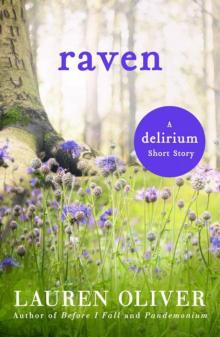 Raven: A Delirium Short Story
Raven: A Delirium Short Story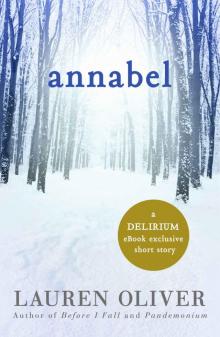 Annabel: A Delirium Short Story
Annabel: A Delirium Short Story Hana: A Delirium Short Story
Hana: A Delirium Short Story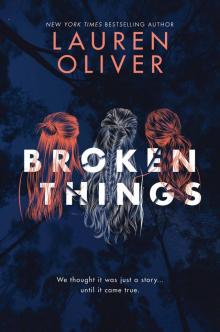 Broken Things
Broken Things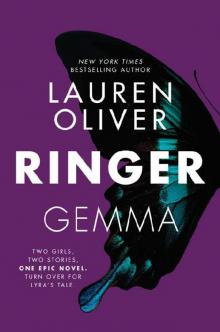 Ringer (Replica)
Ringer (Replica) Alex (delirium)
Alex (delirium)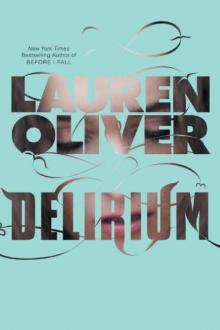 Delirium dt-1
Delirium dt-1